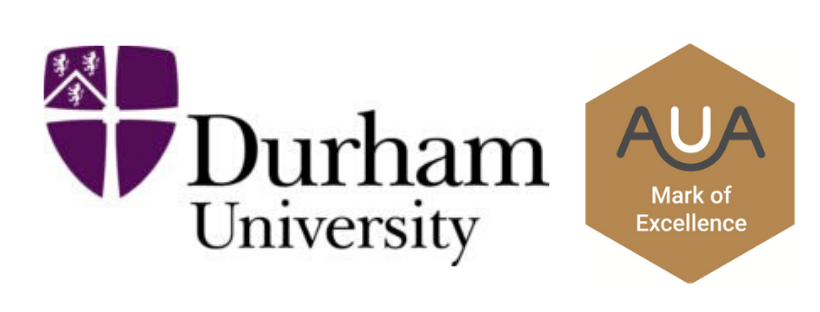
The Mark of Excellence
Congratulations to Durham University
Three years after becoming the first university to be awarded the AUA Mark of Excellence, Durham University has successfully achieved the Mark for a further three years. Despite experiencing a significant amount of change throughout the whole institution, Durham has successfully managed not only to further develop their ‘Realising your potential approach’, their professional behaviours framework based on the AUA CPD Framework but have also continued to embed it across the university.
Amanda Oliver, Mark of Excellence Panel Chair and Chair of Board of Studies commented, “The Mark of Excellence panel reviewed the reassessment application for Durham and were very impressed that significant progress had been made since the award of the Mark three years ago. Many of the processes are now embedded and the panel were pleased to note good practice, some of which was considered by the panel as sector leading. Congratulations Durham, well deserved.”
We asked Durham a few questions about their achievement.
Why did you decide to apply for re-assessment of the Mark?
To demonstrate that as an institution we are committed to developing our professional services staff (PSS), the Mark demonstrates the investment Durham has made to these staff and is a commitment to their further development. It celebrates the excellent personal and professional development opportunities available for PSS. It also gives us credibility within the sector and national recognition and endorsement of Durham’s approach to developing staff.
Over the past three years there has been significant change at Durham, how did you manage to further develop your use of the AUA CPD Framework in spite of this?
We have used the Framework as a way to support PSS through change as it was even more important to keep the emphasis on supporting and developing colleagues during this time.
How has the Framework supported your work on developing career pathways for your professional services staff?
- It informed the establishment of 9 core skills to complement the 9 behaviours
- We have embedded the RYPA into new job families job descriptions
- Helped staff to use as they were already used to reflecting wider via the embedding of RYPA in Annual Development Reviews
- The Framework forms part of the career pathways by highlighting the associated behaviours required for progression
- It forms an integral part of the Personal Development Workbooks launched in February 2019 as a tool to help all PS to identify potential skills gaps and plan training and development to meet needs. The workbooks include training needs analysis for Job Family Core Skills, RYPA behaviours and Occupational Skills required at each Job Family role and grade.
- Used lessons learnt when implementing RYPA to inform the development of career pathways
What have been the main benefits of using the RYPA approach for your PS colleagues and as an organisation? What impact has it had?
Benefits
- We can demonstrate our commitment to the development of professional services staff
- It has informed development of transparent and logical career paths allowing staff to clearly see what is expected at each level
- Improved ability to identify skills gaps and plan training and development requirements
Impact
The wider and deeper impact of the RYPA has included cultural and behavioural change, increased knowledge and understanding of the wider organisation and the sector as a whole, and a common language to facilitate open and honest communication and constructive feedback. There is also a greater sense of professional services staff identity as professionals and recognition of core and transferable skills that can be applied across the university.
The assessment panel was particularly impressed by the scale and reach of Realising Your Potential Approach. Was there any resistance to using it and how did you persuade people of the benefits to using a behavioural approach?
Certain groups of staff e.g. technicians did not see the relevance however Durham has now signed the Technician Commitment and developed a career pathway so they can see more appropriate use for the RYPA. To overcome resistance, we made sure to have involvement of staff in working groups and provided practical training for managers and staff highlighting the benefits of the RYPA.
What advice would you give to other institutions who are thinking about using the AUA CPD Framework or applying for the AUA Mark of Excellence?
- Obtain a senior sponsor to champion the use of the Framework / application of the Mark of Excellence
- Consider the timing of the introduction of any new framework
- Ensure the CPD framework can be embedded into all aspects of the employee lifecycle to encourage buy-in
- Ensure involvement of the Unions
- Communicate with all stakeholders, invite feedback and ensure involvement of staff from a range of areas and enable them to have a voice
- It is an excellent tool, flexible to support your own institution approach and values, adds kudos to the work undertaken by staff development and helps professionalisation of the sector

1 comment on “The Mark of Excellence | Congratulations to Durham University”